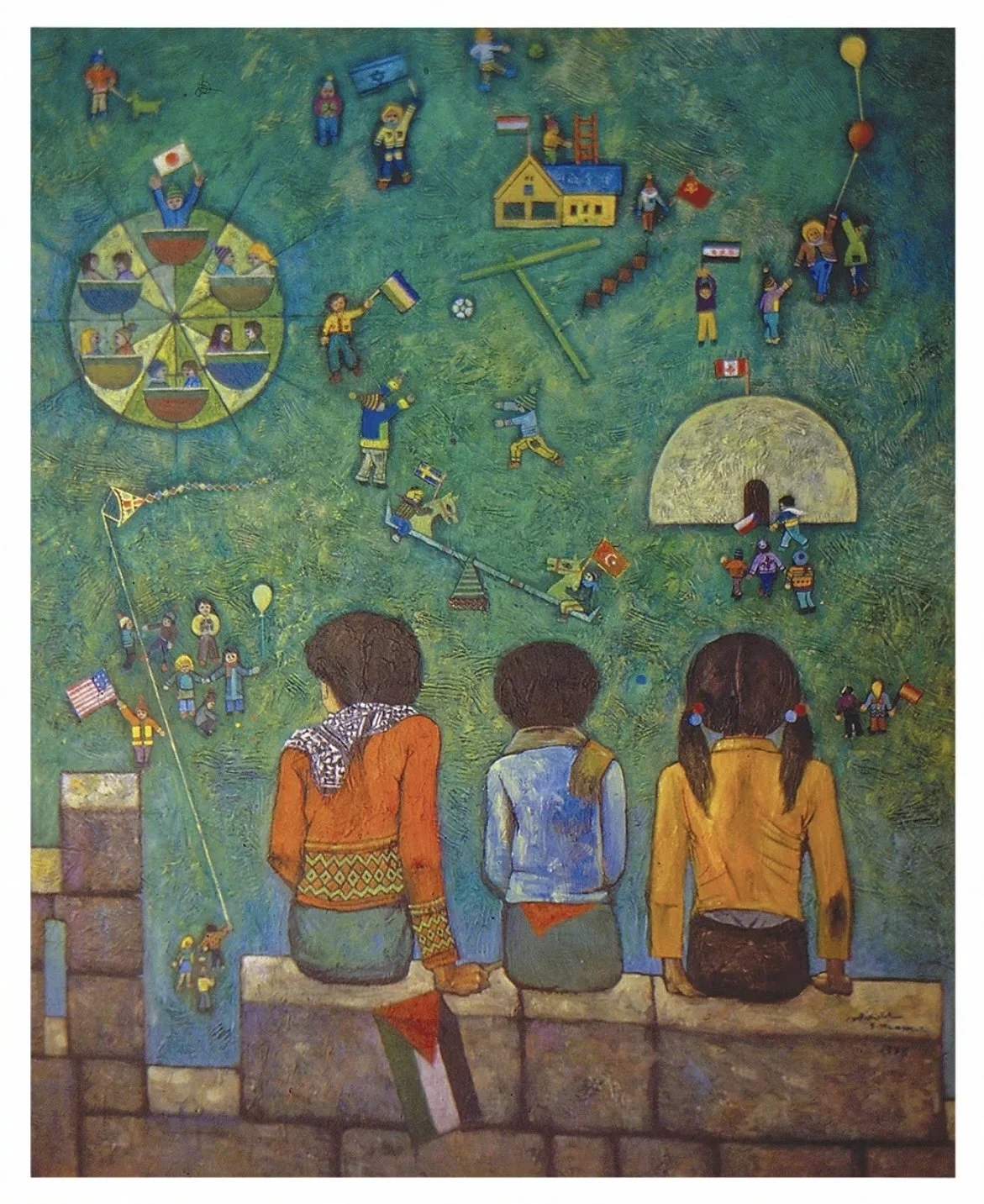A Distressing DNC
by Jonathan Kuttab
Mansour, Sliman. Children of Jerusalem, 1978. Oil on canvas.
Like many of you, I watched the events of the Democratic National Convention, hoping against hope for any crumbs of sympathy, concern, empathy, or recognition of the ongoing genocide and the role of the US in it, and for any hint of deviation by Kamala Harris from Biden’s insane commitment to support Israeli genocide—even beyond the expectations of the Israeli government itself.
I, too, had hoped that the message of the Uncommitted Movement and the brave protestors who steadfastly attempted to move the Democrats in that direction would be heard. Instead, they were not just ignored but even mocked, vilified, and roundly rebuffed by the leadership of the DNC. The DNC platform on Israel/Palestine could have been (and probably was) written by AIPAC. It contained a strong reaffirmation of support for Israel’s “right to defend itself,” of continued military support, and of resisting any effort “to delegitimize Israel,” including any calls for UN sanctions or supporting the BDS movement.
As the convention celebrated the Democratic Party’s “inclusivity, openness, and ability to grant unprecedented power and access” to minorities and marginalized groups, from labor, to women, to immigrants, and the poor, it pointedly refused to acknowledge the most vulnerable and desperate: the Palestinians. I kept thinking of Sliman Mansour’s painting, Children of Jerusalem, of children from all over the world, joyously waving their various national flags while the one Palestinian child sitting with them on the wall had to hide his Palestinian flag behind his back. He was forced to remain invisible in order not to disrupt the party or risk making someone with far more power feel uncomfortable.
The height of humiliation came when the organizers allowed the relatives of Israeli hostages to share their grief and pain but pointedly refused to allow, to the very last minute, any Palestinian the space to share his or her far greater grief and pain for a few minutes before the convention.
I waited until the very end, again hoping that Kamala would correct this state of affairs in her final speech. She did address Gaza, reiterating support for Biden’s policies, support for Israel, and claiming that the administration was working tirelessly to achieve a ceasefire that would lead to the release of hostages. She promised to work for a secure Israel, with “dignity, freedom and self determination” for Palestinians. The convention erupted in applause and a standing ovation. Clearly (as polls show) there is much support for Palestinian rights among the rank and file of the Democratic Party, but in the halls of power, that support for “self determination” does not translate into allowing even a single spot for Palestinians to speak for a few minutes from the podium about their ongoing genocide.
Pro-Israeli forces (and the Hebrew press) gleefully celebrated this slap in the face of Palestinian advocates and activists. The Democratic Party, they crowed, was firmly pro-Israeli. Others tried to downplay the debacle and sought ways to persuade reluctant activists to still vote for Harris, by saying they have no alternative, as Trump is clearly far more toxic when it comes to all progressive issues. Yet again, Palestinians are being asked to accept that there is an “exception for Israel” in all matters: that principles of justice, human rights, international law, and decency do not apply to them; that Palestinian lives, regrettably, are not worth as much as Jewish lives; and that for the sake of the “common good,” Palestinians should quietly slip into the background and not make a fuss.
Part of the distress many of us are feeling is a result of our buying into the false hope that the Democratic Party, Kamala Harris, or the November election results will somehow bring us deliverance: that our meager efforts to work within the system can somehow deliver justice for Palestine and peace for the inhabitants of the Holy Land; and that a change in the wording of the Democratic Platform, or that some other benevolent nod by the Democratic frontrunner, will relieve the suffering of our siblings in Gaza.
Throughout the convention, however, my mind kept returning to the Magnificat, the song of Mary in Luke 1:46-55, reminding me that God is ultimately in control:
He has shown strength with his arm;
he has scattered the proud in the thoughts of their hearts;
he has brought down the mighty from their thrones
and exalted those of humble estate;
he has filled the hungry with good things,
and the rich he has sent away empty.
For me, this is quite a comfort. It does not mean that we refrain from our acts of protest, advocacy, and attempts to influence our representatives. It simply reminds us that we do so in obedience to the commands of God, in whom alone we ultimately trust for the outcome.
So, what about the November elections? Well that is the subject of another article. I will simply repeat here the words of Rev. Munther Isaac, who emphasized on his recent U.S. tour that what happens in November is of far less importance than what will happen in September, when the schools open and the battle over the encampments and student rights to free expression is resumed.

